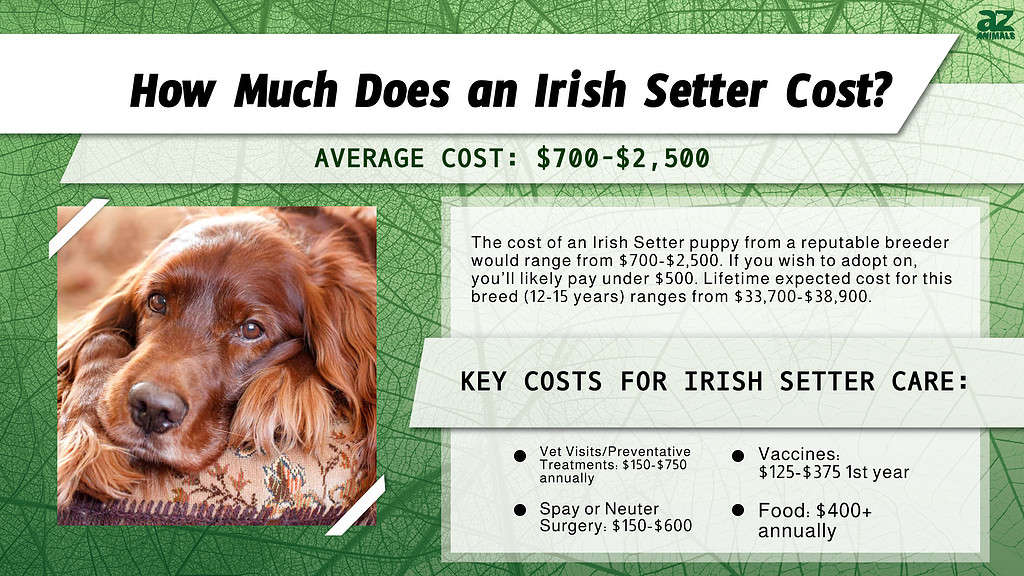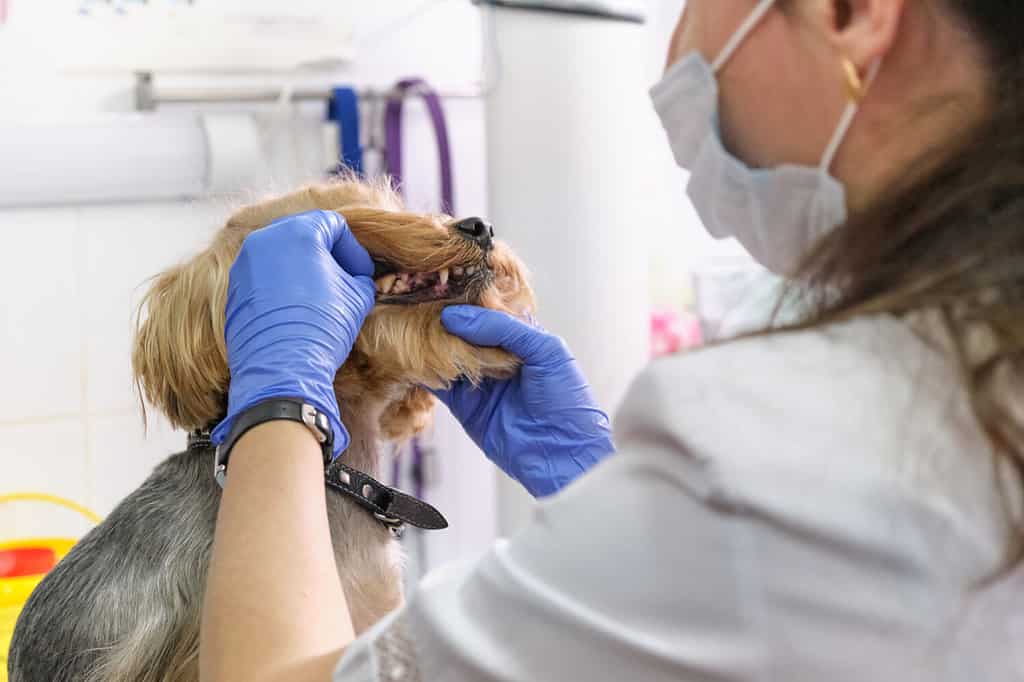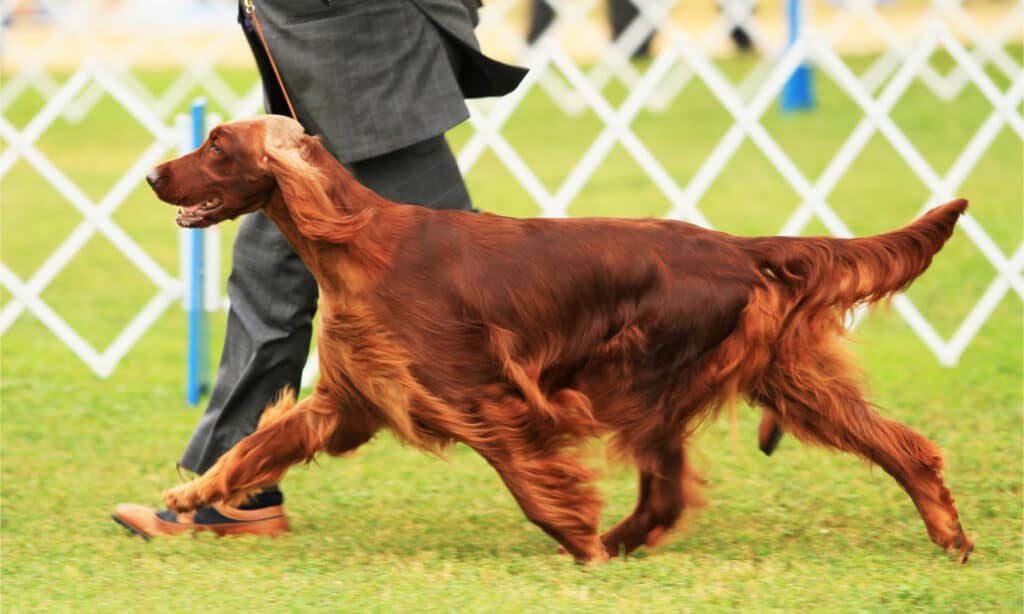Planning ahead is important when adopting any pet. Something many people forget when wrapped up in the excitement of adopting an Irish setter is to plan for the cost of their care!
Irish Setter puppies cost around $700-$2500. You can plan to spend $3,500 on top of this in the first year and $2,600+ for each year after. Lifetime expenses can add up to $33,000 or more!
In this article, we’ll discuss how much Irish setters cost, including puppy prices, daily care, and veterinary care.
Please remember that Irish setter prices will vary based on your area. Prices listed in this article are based on average costs and may not reflect your own spending.

How Much Does an Irish Setter Puppy Cost?
Irish setter puppies from a breeder can range in price from $700-$2500. If you choose to adopt from a rescue or shelter, you’re likely to pay under $500.
For reputable breeders, this cost goes back into the dogs to cover genetic health testing, food, veterinary bills, and other expenses.
Reputable rescues function similarly, with your adoption fees helping them to rescue future dogs.
Many rescues and breeders put more into their dogs than they charge for them and don’t profit from breeding or rescuing dogs.

The cost of your Irish setter will depend on where you adopt from.
Other Factors That Influence the Purchase Price of an Irish Setter
Your Irish setter puppy may range in price due to the breeder’s location, the dog’s pedigree, and the care that the breeder puts into their dogs.
Very cheap Irish setters are likely going to be from puppy mills or backyard breeders. However, the same often goes for very expensive pups! Irresponsible breeders often try to minimize their costs at the dogs’ expense while also charging as much as they can get away with to further maximize profits.
Most, but not all, reputable breeders will charge mid-range. Breeders in areas with high cost of living will typically charge more for their puppies, as will those whose puppies have famous or award-winning lineage.
Please keep in mind that reputable breeders rarely recoup what they spend on their dogs, especially when you account for their time raising and training the puppies. If your breeder goes above and beyond in this realm, they may charge extra as well. One obvious example is if you’re purchasing a service dog that’s received a great deal of training.
Cost of Vaccination and Other Medical Expenses for Irish Setters

Veterinary costs tend to be the most expensive part of dog ownership.
©Reddogs/Shutterstock.com
Veterinary care is an often-ignored cost when first adopting a dog, which can be a fatal mistake! It’s important to consider whether you can afford both routine care and emergency expenses.
Keep in mind that emergency expenses can quickly run into the thousands or even tens of thousands of dollars. This is what makes pet insurance so essential, especially for those of us without large savings accounts.
Vaccines – $25-75 per vaccine
Vaccines will typically cost around $25-75 a piece, depending on the cost of living in your area, your vet’s pricing, and whether you utilize a free or low-cost program. Sometimes, organizations such as animal shelters will have free vaccination days for low-income community members.
The rabies vaccine is required by law in most states, while everything else is typically optional. Dog vaccines are split into two categories: core vaccines that vets recommend for every dog and optional vaccines that depend on the dog’s lifestyle.
Irish Setter Vaccine Schedule
| Vaccine | Initial Timeframe | Boosters | Core Vaccine? |
| Rabies | 12-16 weeks old | One year after initial vaccination, then once every three years | Yes |
| DHLPP (distemper, hepatitis, leptospirosis, parainfluenza, and parvo) | Six weeks old | Eight weeks, 12 weeks, and 16 weeks old Another booster one year later, then once every one to three years | Yes |
| Bordetella | Six to eight weeks old | 10-12 weeks old, then once every six to 12 months | No |
| Leptospirosis | 12 weeks old | Two to four weeks after initial vaccine, then yearly boosters | No |
| Canine Influenza | 6-8 weeks old | Two to four weeks after initial vaccine, then yearly boosters | No |
| Lyme | 8-10 weeks old | Two to four weeks after initial vaccine, then yearly boosters | No |
| Coronavirus | 6-12 weeks old | Two to four weeks after initial vaccine, then yearly boosters | No |
| Rattlesnake Vaccine | 16 weeks old | 30 days after initial vaccine, then boosters every six to 12 months | No |
The cost of core vaccines only will be $125-$375 in the first year, not counting exam fees or any other part of your vet visits. They’ll continue to cost $50-$150 if given every three years and more if your vet recommends the DHLPP vaccine yearly.
A dog receiving all of the above vaccines will cost you $475-$1575 in the first year, depending on vaccine costs and frequency of the DHLPP, Bordetella, and Rattlesnake vaccines. You’ll also pay around $166-$700 yearly for the remainder of your setter’s life.
Most people will fall somewhere in the middle of these ranges, as your vet will likely recommend some non-core vaccines–but most dogs don’t require all of them.
For instance, I don’t live in an area with rattlesnakes and haven’t had the vaccine recommended for my pups. But, the Lyme vaccine is highly recommended due to the amount of deer ticks in my area.
Spay or Neuter Surgery – $150-$600
Spay or neuter surgery costs can vary greatly depending on your vet or whether you even see a vet for the procedure. There are low-cost programs that spay and neuter a massive amount of animals in very short timeframes and charge much less than a veterinary clinic.
The benefit of having the surgery done at your vet’s office is that your dog will be closely monitored and will have more resources available to them should something go wrong. Your vet may also complete a physical before the surgery to ensure your dog is healthy enough for the procedure and is more likely to prescribe painkillers after the surgery.
So, while there’s no shame in utilizing low-cost programs (and this surgery is relatively safe regardless of where you go), paying more at the vet clinic does have its benefits. In this situation, you typically get what you pay for.
Check-Ups – $50-$250 per visit
Check-ups can vary in price depending on where you go, the tests your vet decides to run, and if any problems arise. A basic check-up should include a physical exam, bloodwork, heartworm test, and stool sample.
Healthy adult dogs should see the vet for an annual check-up and whenever they’re sick. Puppies tend to visit more often while they’re receiving their initial vaccines, and seniors should be brought in for a check-up once every six months.
Parasite Prevention Medications – $100-$500 per year
Parasite prevention medications are used to prevent your dog from getting fleas, ticks, mites, heartworms, and other pests. They’re vital to keeping your dog healthy and should be utilized year-round.
While parasite prevention medications can be expensive, treatment once a dog is infested is often more costly. It can also be a long process to get rid of pests like fleas once they’re in the home, and things like heartworms are incredibly painful for your dog.
Dental Care – $300-$700+ per cleaning

Poor dental hygiene can lead to irritated gums in a dog.
©Yavdat/Shutterstock.com
You can save a lot of money on dental care by keeping on top of your Irish setter’s teeth at home. This includes brushing their teeth daily and providing chews and other dental hygiene items.
Veterinarians typically recommend yearly professional cleanings, but most people don’t brush their dogs’ teeth! Your vet is likely to recommend against yearly dental cleanings if your dog’s teeth are clean and healthy.
Sick Vet Visits – costs range widely
There’s no way to predict in what ways your Irish setter will get sick throughout their lifetime or how much it’ll cost. Sick veterinary visits can range from simple problems that cost a few hundred dollars to treatments that cost tens of thousands.
Pet insurance can make your spending much more predictable in this area, especially if you purchase a plan that covers the entirety of your bill.
Common Irish Setter Health Conditions
Here are a few common health problems in Irish setters to give you an idea of what may come up and how much it can cost:
- Hip dysplasia – $1,500-$7,000 per hip for surgery if required
- Bloat – $1,500-$7,500 for emergency veterinary treatment
- Hypothyroidism – $50-150 for testing and $20-$50 per month for medication
Cost of Food and Supplies for Irish Setter

Food and supply costs for large dogs like Irish setters can be expensive.
©DragoNika/Shutterstock.com
Food – $400+ yearly
The cost of dog food heavily depends on what you feed your dog. Since Irish setters are large dogs, most people choose to feed kibble as it’s the most budget-friendly. You might also choose to feed canned, fresh, raw, or some combination of these and kibble.
Please remember that more expensive foods aren’t always better for your dog’s health. Veterinarians will typically recommend a food that meets WSAVA guidelines, which includes employing a veterinary nutritionist to formulate the diet.
In addition, the Federal Department of Agriculture (FDA) and the American Veterinary Medical Association (AVMA) both recommend against feeding dogs raw food for the health of pets and humans alike.
The cost of a veterinarian-approved kibble is around $400+ yearly. You can purchase cheaper foods for less, and you can also spend a lot more if you aren’t feeding kibble only!
Initial Purchases – $50-$600+
Your initial purchases will include:
- Food and water bowls
- Collar and leash
- Harness (optional)
- Brush
- Nail clippers or Dremel
- At-home crate (optional)
- Crash-tested doggy seatbelt or crate for the car (optional but highly recommended)
Overall, everyone’s budget will vary depending on what you choose to buy. You may spend as little as $50 or as much as $600+ on your dog’s things.
You may also decide to stock up on repeat purchases such as toys, food, or treats. This can greatly increase your budget but can also provide an added sense of security and allow you to focus on your new pup rather than constantly running out to the store.
On the other hand, if you already have some of these items from your current or previous pups, you can save some money by not repurchasing them. Second-hand items can also reduce your costs.
Repeat Purchases – costs range widely
Repeat purchases include things you’ll need to buy monthly, such as food, treats, and dental care items.
They also include items your Irish Setter pup chews that need to be replaced, such as your socks or their toys. Puppies tend to cost the most in this department, with costs reducing as your dog leaves their teething phase.
It can be difficult to predict how much replacement items will cost since some well-managed dogs will only destroy the occasional toy, and some reckless pups will chew up furniture or other expensive items.
Household Purchases – costs range widely
You might also need to purchase household items for your Irish Setter, such as baby gates, furniture covers, or even fencing for the backyard. As you can imagine, these things vary wildly in price and depend heavily on your home and lifestyle.
Some will only need to buy a $40 baby gate to block off the stairs, while others will spend thousands on fencing.
How Much Does It Cost to Insure an Irish Setter?

TrustedPals Pet Insurance offers affordable plans and a variety of coverage options.
©iStock.com/zimmytws
Pet insurance for Irish setters typically costs anywhere from $20-$120 a month. The biggest factor that affects price is your plan’s coverage.
Cheap plans tend to have higher deductibles and cover a smaller percentage of your vet bill. They don’t tend to cover wellness visits.
A low deductible plan that covers 90-100% of the bill, or a plan that covers wellness visits, is going to be the most expensive.
Other factors are your Irish setter’s age and the company you purchase a plan from. Please keep in mind that the majority of pet insurance companies do not cover pre-existing conditions. If you want to purchase pet insurance, you should do so as soon as you adopt your dog.
Generally, pet insurance is recommended unless you have a large savings account already set up upon adoption. Some people choose to begin putting money into savings post-adoption, but this is a gamble–you’re betting on your pup not getting sick until you’ve saved enough to cover it and never getting sicker than you can afford.
How Much Does It Cost to Train an Irish Setter?

Some people pay nothing to train their Irish setter, while others pay professional trainers thousands of dollars.
©Canden Scales/Shutterstock.com
Training can range from free to thousands of dollars. Training your Irish setter by yourself is the cheapest, while one-on-one training sessions are the most expensive.
Puppy classes fall in the middle, typically costing a few hundred dollars. If you don’t know anything about training dogs, finding a good puppy class with a force-free dog trainer is highly recommended.
When training yourself or looking for a trainer, please remember that aversive training methods harm dogs. Look for trainers who use labels such as force-free or positive reinforcement.
Avoid those who talk about being the “alpha,” leading the pack, or dominating your dog, as all of this has been long disproven. Also, avoid balanced trainers, as this label means they are willing to use aversives and are often willing to hurt your dog in order to get them to behave.
Lifetime Costs of an Irish Setter
Average first-year costs for an Irish setter are upwards of $5,100. In the following years, you can expect to pay around $2,600+.
We came to these numbers by taking the mid-range cost of each item listed above. Not included in these budgets are training expenses, repeat, and household purchases, and sick and emergency vet visits not covered by pet insurance.
Irish setters tend to live anywhere from 12-15 years, giving you a lifetime expected cost of $33,700-$38,900.
You may spend much more or less than this on your pup since everyone budgets differently! Once again, please remember that these are only estimates based on average numbers available at the time of writing this article.
Thank you for reading! If you have feedback on this post, please contact the AZ Animals editorial team.
The photo featured at the top of this post is © DragoNika/Shutterstock.com
Ready to discover the top 10 cutest dog breeds in the entire world?
How about the fastest dogs, the largest dogs and those that are -- quite frankly -- just the kindest dogs on the planet? Each day, AZ Animals sends out lists just like this to our thousands of email subscribers. And the best part? It's FREE. Join today by entering your email below.
Thank you for reading! Have some feedback for us? Contact the AZ Animals editorial team.







